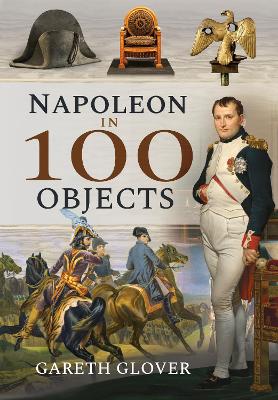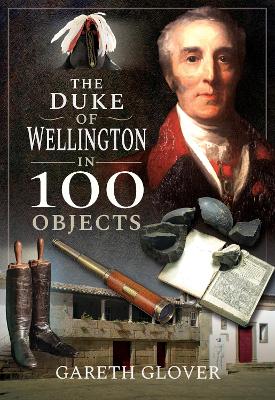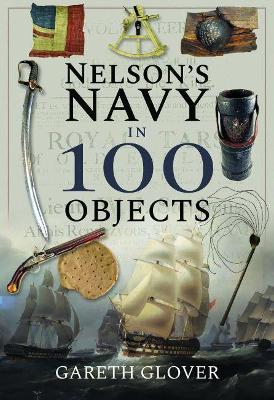In 100 Objects
3 total works
For almost two decades, Napoleon Bonaparte was the most feared, and revered, man in Europe. At the height of his power, the land under his control stretched from the Baltic to the Mediterranean, and encompassed most of Western Europe.
The story of how a young Corsican, who spoke French with a strange accent, became Emperor of the French at the age of just thirty-three is a remarkable one. The many fascinating objects brought together in this book detail not only Napoleon's meteoric rise to power, but also his art of war and that magnificent fighting force, the Imperial Guard, which grew from a small personal bodyguard to the size of a small army. Some of his great battles, such as Marengo, Austerlitz, Jena and Wagram, are also explored, as is Napoleon's great Oriental adventure, which saw him conquer Egypt. He took with him artists and scientists, which led to the discovery of the Rosetta Stone and the deciphering of the Egyptian hieroglyphs.
Napoleon, however, took a step too far when he marched into Russia. The vast distances and the weather wrecked his army and he was never able to recover - and, eventually, his enemies proved too strong. France was invaded and he was compelled to abdicate. Napoleon was not finished, though, and he returned from exile to lead France into war one more time, only for his army to be beaten beyond all hope of recovery in the muddy Flanders fields at Waterloo.
In this engaging and hugely informative book, the author takes us on a journey across Napoleonic Europe to discover the places, people and objects that tell the story of one man's life. It is a story of one of the most turbulent eras in history, one that, to this day, still bears Bonaparte's name. But his legacy lives on in the French legal and social systems and he remains as enigmatic a figure today as he did 200 years ago.
The story of how a young Corsican, who spoke French with a strange accent, became Emperor of the French at the age of just thirty-three is a remarkable one. The many fascinating objects brought together in this book detail not only Napoleon's meteoric rise to power, but also his art of war and that magnificent fighting force, the Imperial Guard, which grew from a small personal bodyguard to the size of a small army. Some of his great battles, such as Marengo, Austerlitz, Jena and Wagram, are also explored, as is Napoleon's great Oriental adventure, which saw him conquer Egypt. He took with him artists and scientists, which led to the discovery of the Rosetta Stone and the deciphering of the Egyptian hieroglyphs.
Napoleon, however, took a step too far when he marched into Russia. The vast distances and the weather wrecked his army and he was never able to recover - and, eventually, his enemies proved too strong. France was invaded and he was compelled to abdicate. Napoleon was not finished, though, and he returned from exile to lead France into war one more time, only for his army to be beaten beyond all hope of recovery in the muddy Flanders fields at Waterloo.
In this engaging and hugely informative book, the author takes us on a journey across Napoleonic Europe to discover the places, people and objects that tell the story of one man's life. It is a story of one of the most turbulent eras in history, one that, to this day, still bears Bonaparte's name. But his legacy lives on in the French legal and social systems and he remains as enigmatic a figure today as he did 200 years ago.
Arthur Wellesley, the Duke of Wellington, was the outstanding British individual of the nineteenth century. His victories at Seringapatam and Assaye extended British control in India and his famous campaign in Spain and Portugal helped to drive Napoleon into exile. Wellington is, of course, mostly remembered for defeating Napoleon at Waterloo and his prestige after that epoch-changing event saw him becoming Prime Minister of Great Britain on two occasions.
These are the commonly-known facts about the Iron Duke, but in this remarkable investigation into the life of Britain's greatest general, we learn so much more about Wellington as a person, through the objects, large and small, that marked key episodes in his personal, military and public life. Renowned historian Gareth Glover details Wellington's family background in Ireland, his early military career, his one-and-only meeting with Nelson, his campaigns in Flanders, the Iberian Peninsula and Waterloo. What we also learn is of his difficult marriage - and his scandalous womanising, even bedding the same woman as Napoleon - and his strained relationship with his two boys.
His political career was a controversial one, including his fight to pass the Catholic Emancipation Bill and of a period of three months when he ran the government by himself because he refused to appoint any Cabinet ministers!
Packed with more than 200 full-colour photographs, _The Duke of Wellington in 100 Objects_ will show the world the objects he touched, or which touched him, in the life of one of the most outstanding characters Britain has ever produced.
These are the commonly-known facts about the Iron Duke, but in this remarkable investigation into the life of Britain's greatest general, we learn so much more about Wellington as a person, through the objects, large and small, that marked key episodes in his personal, military and public life. Renowned historian Gareth Glover details Wellington's family background in Ireland, his early military career, his one-and-only meeting with Nelson, his campaigns in Flanders, the Iberian Peninsula and Waterloo. What we also learn is of his difficult marriage - and his scandalous womanising, even bedding the same woman as Napoleon - and his strained relationship with his two boys.
His political career was a controversial one, including his fight to pass the Catholic Emancipation Bill and of a period of three months when he ran the government by himself because he refused to appoint any Cabinet ministers!
Packed with more than 200 full-colour photographs, _The Duke of Wellington in 100 Objects_ will show the world the objects he touched, or which touched him, in the life of one of the most outstanding characters Britain has ever produced.
The Royal Navy of Nelson's time was such a huge organisation, that it is sometimes hard to comprehend its full scope. Indeed, during the Napoleonic Wars it was by far the largest employer in the entire world.
Not only did the Royal Navy maintain a fleet of close on 1,000 ships, including over 100 line of battle ships, but it was also responsible for the entire organisation of maintaining them at sea. From the recruitment of crews, the maintenance and protection of bases throughout the world, the production and delivery of food supplies to feed this vast fleet and the procurement of naval supplies to keep the ships at sea, it was all the responsibility of this vast organisation.
The Royal Navy was often Britain's last line of defence and many of its most successful officers became superstars, although none eclipsed Admiral Lord Nelson, who became the personification of the Navy. The whole country revelled in their successes and 'Jolly Jack Tar' became a source of national pride and a huge number of naval terms were taken into normal life and many are often still used to this very day.
_Nelson's Navy in 100 Objects_ investigates all aspects of this incredible organisation and the lives of the men who served within it, including Nelson himself, using historical artefacts and naval terms that are now part of everyday language to illustrate them.
Not only did the Royal Navy maintain a fleet of close on 1,000 ships, including over 100 line of battle ships, but it was also responsible for the entire organisation of maintaining them at sea. From the recruitment of crews, the maintenance and protection of bases throughout the world, the production and delivery of food supplies to feed this vast fleet and the procurement of naval supplies to keep the ships at sea, it was all the responsibility of this vast organisation.
The Royal Navy was often Britain's last line of defence and many of its most successful officers became superstars, although none eclipsed Admiral Lord Nelson, who became the personification of the Navy. The whole country revelled in their successes and 'Jolly Jack Tar' became a source of national pride and a huge number of naval terms were taken into normal life and many are often still used to this very day.
_Nelson's Navy in 100 Objects_ investigates all aspects of this incredible organisation and the lives of the men who served within it, including Nelson himself, using historical artefacts and naval terms that are now part of everyday language to illustrate them.


